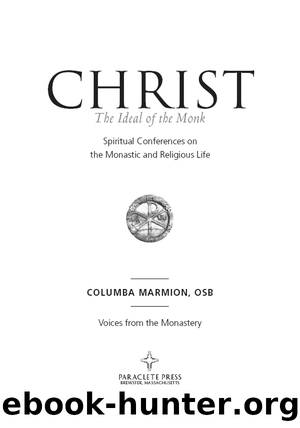Christ the Ideal of the Monk by Columba Marmion

Author:Columba Marmion
Language: eng
Format: epub
Publisher: Paraclete Press
Published: 2014-01-15T00:00:00+00:00
And yet has not man a natural right to possess? The simple Christian living in the world can fully use his faculty of having possessions without compromising his salvation and perfectionâfor, in this matter, it is not a precept but a simple counsel that our Lord gives when he speaks of leaving everything in order to be his perfect disciple. The action of divine grace in the soul of an ordinary Christian is hindered only by the ill-regulated attachment that makes his soul captive to exterior possessions.
But for us who for love of Christ, and in order to follow him more freely, have voluntarily renounced this right, it would be in some measure a sin to attempt to take it back unduly. We must have nothing of our own. Thank God for that, for it is a great grace to be fully detached. However, let us examine things more closely, for there is more than one way of having anything of oneâs own.
It cannot even be a question here of hoarding. At the last day we should fear to appear before God if we are in possession of something hoarded. But, without going so far as this, there are different ways of making any object whatsoever âoneâs own.â
It may happen, for example, that a religious makes himself from the very first so difficult that he surrounds some book or other object with a hedge of thorns, so to speak, and in such a way that no one dare ask it from him. In theory, this object is for the common use; in fact, it has become the property of this religious. Little things, in themselves, but the detachment resulting from them can become dangerous for the soulâs liberty. The principle of our perfection itself is at stake.
âLet all things be common to all,â says St. Benedict. That is one of the characters of monastic poverty as he intends it to be.76 By these words he refers to the community of goods that existed between the faithful of the early Church. He ordains that âanyone who treats the things of the monastery in a slovenly or negligent manner shall be punished.â77 Why this severity? Because the monastery being the âhouse of God,â all things in it ought to be considered âas if they were the consecrated vessels of the altar.â78 Once more we see the deeply supernatural and âreligiousâ character with which the holy legislator wishes to steep the monkâs whole existence, even in the least details.
Download
This site does not store any files on its server. We only index and link to content provided by other sites. Please contact the content providers to delete copyright contents if any and email us, we'll remove relevant links or contents immediately.
The Secret Power of Speaking God's Word by Joyce Meyer(3135)
More Language of Letting Go: 366 New Daily Meditations by Melody Beattie(3014)
To Light a Sacred Flame by Silver RavenWolf(2800)
How Proust Can Change Your Life by Alain De Botton(2788)
Anxious for Nothing by Max Lucado(1958)
A TIME TO KEEP SILENCE by Patrick Leigh Fermor(1888)
Curse Tablets and Binding Spells from the Ancient World by Gager John G.;(1856)
The Gnostic Gospel of St. Thomas by Tau Malachi(1778)
7 Secrets of Divine Mercy by Vinny Flynn(1722)
all by Unknown Author(1668)
365 Tao: Daily Meditations by Ming-Dao Deng(1605)
From Good Goddess to Vestal Virgins: Sex and Category in Roman Religion by Ariadne Staples(1556)
100 Days of Thanks by Thomas Nelson(1551)
To Ride a Silver Broomstick by Silver RavenWolf(1544)
Anam Cara by John O'Donohue(1538)
The Fasting Edge by Jentezen Franklin(1523)
To Stir a Magick Cauldron by Silver RavenWolf(1510)
The Sacred Enneagram by Christopher L. Heuertz(1421)
New Morning Mercies by Paul David Tripp(1372)
